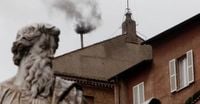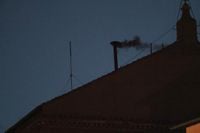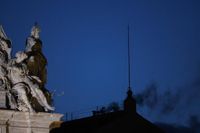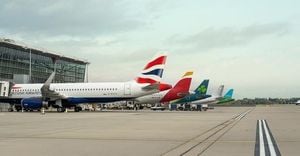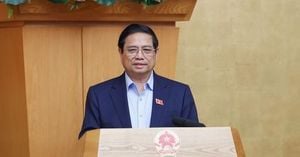On Wednesday, May 7, 2025, the conclave to elect the successor to Pope Francis officially commenced, but the decision remains elusive as black smoke billowed from the chimney of the Sistine Chapel, signaling that no consensus was reached among the voting cardinals.
As the clock struck 4 PM Brasilia time, approximately 45,000 faithful gathered in St. Peter's Square awaited the outcome. The first round of voting lasted about three hours and twenty minutes, but ultimately, no cardinal secured the necessary two-thirds majority—89 votes—to be elected as the new pope.
The atmosphere was charged with anticipation as the 133 cardinals, cloistered within the chapel, adhered to a solemn oath of secrecy before beginning their deliberations. The first voting session is traditionally a test of allegiances, often reflecting the ideological divides among the cardinals. As noted by Vatican experts, this initial vote is typically not decisive.
Earlier in the day, a mass was held at 10 AM in St. Peter's Basilica, presided over by Cardinal Giovanni Battista Re, the dean of the College of Cardinals. The ceremony, known as pro eligendo pontifice, called upon the divine guidance of the Holy Spirit to assist the cardinals in their momentous task. "The entire Church, united with us in prayer, constantly invokes the grace of the Holy Spirit, so that a worthy Shepherd of the whole flock of Christ may be elected by us," he said.
Following the mass, the cardinals proceeded to the Casa Santa Marta for lunch and prayer before making their way to the Sistine Chapel at around 4 PM. Upon arrival, the traditional Latin call, "extra omnes"—which translates to "everyone out"—was announced, allowing only the electors to remain in the chapel.
The conclave is expected to continue with voting on Thursday, May 8, 2025, where up to four voting sessions may occur: two in the morning and two in the afternoon. The schedule for the next day is as follows: the first vote will conclude at 5:30 AM (Brasilia time), and if a pope is not elected, black smoke will emerge from the chimney at 7 AM. The same pattern will repeat at 12:30 PM and 2 PM, with white smoke indicating a successful election.
If the cardinals are unable to reach a consensus by the fourth day of voting, a pause for prayer and reflection will occur, with voting resuming on the sixth day. Should no pope be elected after 12 days and 34 votes, the process will shift to a choice between the two candidates with the highest votes, although the two-thirds quorum remains in effect.
The election of a new pope comes in the wake of the passing of Pope Francis on April 22, 2025. His death marked a significant moment in the Catholic Church, as he was the first pope to resign in nearly 600 years, paving the way for a new leader.
As the world watches closely, the anticipation builds around the potential candidates. Among the seven Brazilian cardinals participating in the conclave, Dom Sérgio da Rocha, the Archbishop of São Salvador da Bahia, is considered a leading contender. His name has surfaced in discussions among analysts, who note that while the chances may be slim, surprises are not uncommon in papal elections.
As the faithful await the signal from the Sistine Chapel, the hope for a new leader who can guide the Catholic Church into a new era remains palpable. The next few days will be pivotal as the cardinals navigate their deliberations, aiming to find a successor who can embody the values and vision of the Church.
With the next voting sessions looming, the faithful remain hopeful for a glimpse of white smoke, which would herald the announcement of "Habemus Papam"—a new pope has been elected. Until then, the world watches and waits, united in prayer and anticipation.
